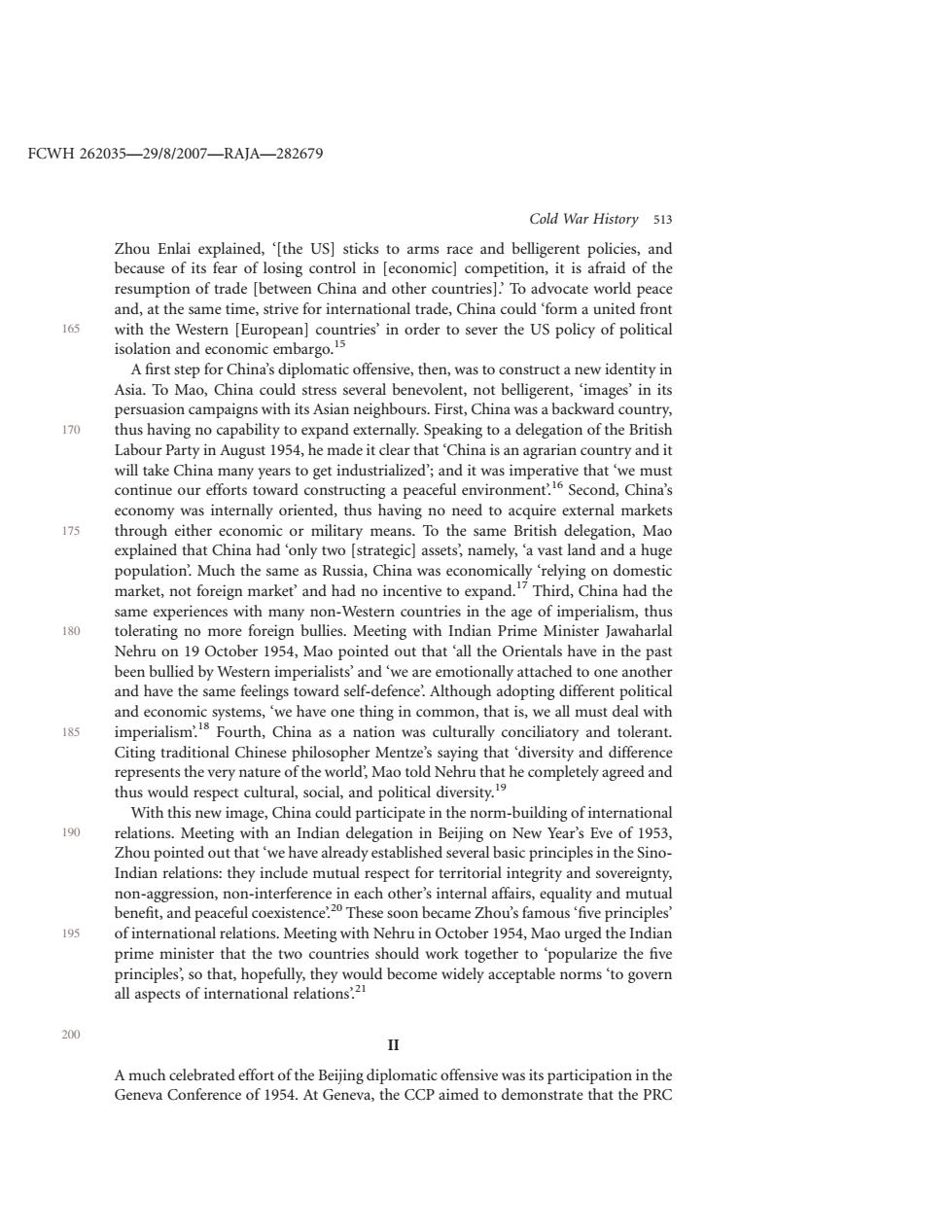正在加载图片...

FCWH262035-29/8/2007-RAJA-282679 Cold War History 513 Zhou Enlai explained,'[the US]sticks to arms race and belligerent policies,and because of its fear of losing control in [economic]competition,it is afraid of the resumption of trade [between China and other countries].To advocate world peace and,at the same time,strive for international trade,China could 'form a united front 165 with the Western [European]countries'in order to sever the US policy of political isolation and economic embargo.15 A first step for China's diplomatic offensive,then,was to construct a new identity in Asia.To Mao,China could stress several benevolent,not belligerent,'images'in its persuasion campaigns with its Asian neighbours.First,China was a backward country, 170 thus having no capability to expand externally.Speaking to a delegation of the British Labour Party in August 1954,he made it clear that'China is an agrarian country and it will take China many years to get industrialized';and it was imperative that 'we must continue our efforts toward constructing a peaceful environment16 Second,China's economy was internally oriented,thus having no need to acquire external markets 175 through either economic or military means.To the same British delegation,Mao explained that China had 'only two [strategic]assets,namely,'a vast land and a huge population.Much the same as Russia,China was economically 'relying on domestic market,not foreign market'and had no incentive to expand.7 Third,China had the same experiences with many non-Western countries in the age of imperialism,thus 180 tolerating no more foreign bullies.Meeting with Indian Prime Minister Jawaharlal Nehru on 19 October 1954,Mao pointed out that 'all the Orientals have in the past been bullied by Western imperialists'and 'we are emotionally attached to one another and have the same feelings toward self-defence.Although adopting different political and economic systems,'we have one thing in common,that is,we all must deal with 185 imperialism Fourth,China as a nation was culturally conciliatory and tolerant. Citing traditional Chinese philosopher Mentze's saying that 'diversity and difference represents the very nature of the world,Mao told Nehru that he completely agreed and thus would respect cultural,social,and political diversity.9 With this new image,China could participate in the norm-building of international 190 relations.Meeting with an Indian delegation in Beijing on New Year's Eve of 1953, Zhou pointed out that 'we have already established several basic principles in the Sino- Indian relations:they include mutual respect for territorial integrity and sovereignty, non-aggression,non-interference in each other's internal affairs,equality and mutual benefit,and peaceful coexistence.20 These soon became Zhou's famous 'five principles' 195 of international relations.Meeting with Nehru in October 1954,Mao urged the Indian prime minister that the two countries should work together to 'popularize the five principles,so that,hopefully,they would become widely acceptable norms 'to govern all aspects of international relations:21 200 II A much celebrated effort of the Beijing diplomatic offensive was its participation in the Geneva Conference of 1954.At Geneva,the CCP aimed to demonstrate that the PRCZhou Enlai explained, ‘[the US] sticks to arms race and belligerent policies, and because of its fear of losing control in [economic] competition, it is afraid of the resumption of trade [between China and other countries].’ To advocate world peace and, at the same time, strive for international trade, China could ‘form a united front with the Western [European] countries’ in order to sever the US policy of political isolation and economic embargo.15 A first step for China’s diplomatic offensive, then, was to construct a new identity in Asia. To Mao, China could stress several benevolent, not belligerent, ‘images’ in its persuasion campaigns with its Asian neighbours. First, China was a backward country, thus having no capability to expand externally. Speaking to a delegation of the British Labour Party in August 1954, he made it clear that ‘China is an agrarian country and it will take China many years to get industrialized’; and it was imperative that ‘we must continue our efforts toward constructing a peaceful environment’.16 Second, China’s economy was internally oriented, thus having no need to acquire external markets through either economic or military means. To the same British delegation, Mao explained that China had ‘only two [strategic] assets’, namely, ‘a vast land and a huge population’. Much the same as Russia, China was economically ‘relying on domestic market, not foreign market’ and had no incentive to expand.17 Third, China had the same experiences with many non-Western countries in the age of imperialism, thus tolerating no more foreign bullies. Meeting with Indian Prime Minister Jawaharlal Nehru on 19 October 1954, Mao pointed out that ‘all the Orientals have in the past been bullied by Western imperialists’ and ‘we are emotionally attached to one another and have the same feelings toward self-defence’. Although adopting different political and economic systems, ‘we have one thing in common, that is, we all must deal with imperialism’.18 Fourth, China as a nation was culturally conciliatory and tolerant. Citing traditional Chinese philosopher Mentze’s saying that ‘diversity and difference represents the very nature of the world’, Mao told Nehru that he completely agreed and thus would respect cultural, social, and political diversity.19 With this new image, China could participate in the norm-building of international relations. Meeting with an Indian delegation in Beijing on New Year’s Eve of 1953, Zhou pointed out that ‘we have already established several basic principles in the SinoIndian relations: they include mutual respect for territorial integrity and sovereignty, non-aggression, non-interference in each other’s internal affairs, equality and mutual benefit, and peaceful coexistence’.20 These soon became Zhou’s famous ‘five principles’ of international relations. Meeting with Nehru in October 1954, Mao urged the Indian prime minister that the two countries should work together to ‘popularize the five principles’, so that, hopefully, they would become widely acceptable norms ‘to govern all aspects of international relations’.21 II A much celebrated effort of the Beijing diplomatic offensive was its participation in the Geneva Conference of 1954. At Geneva, the CCP aimed to demonstrate that the PRC FCWH 262035—29/8/2007—RAJA—282679 Cold War History 513 165 170 175 180 185 190 195 200